by Nic Haygarth | 14/12/18 | Tasmanian high country history
The old vehicular track up the Black Bluff Range at Smiths Plain in north-western Tasmania is scoured down to the bedrock. In places the holes are so deep and slippery that it’s difficult to clamber up; in other places you are buffeted by the scrub over-reaching from both sides. The object of the climb, the Devonport Gold Mine, has lain idle for decades, but even though the road is now impassable for vehicles you can’t help but be impressed by the enterprise of the miners in establishing it.
In making this climb on foot several years ago, I was reminded of Ron Smith’s account of the same journey more than a century earlier. Nowadays you drive to Smiths Plain and walk from there along forestry roads to the base of the bluff. Twenty-six-year-old Smith had no car. Early one morning in December 1907 he set out for Black Bluff from his home at Westwood, near Forth. A fourteen-kilogram swag was balanced on the front of his bicycle, camera (two kg) and field glasses were slung over his shoulders. Four hours after leaving home he decided to eat lunch—at 9.16 am, for all of six minutes!—near Blackwood Park at Nietta. Leaving his bicycle at a point two miles beyond Phillips’ house at South Nietta, and taking a second bite of lunch at 11.45 am, he started across the then mostly button-grass Smiths Plain.[1]
The plain took its name from it being his father’s point of entry to the high country. Prospector James ‘Philosopher’ Smith’s route over the Black Bluff Range and down to the Lea River had been his access to discoveries of gold, copper and manganese he had made in the area. Other prospectors had followed in his footsteps. One was Alf Smith, an unrelated prospector who, like others, had worked on Philosopher Smith’s farm through the winters as part of the latter’s scheme to support mineral prospecting.[2] Panning his way up Devonport Creek in 1902, Alf and his brother-in-law Reuben Richards found what they thought was a gold reef.[3] Alf worked this mine and one at Copper Creek, Lea River, building tiny huts at both sites.
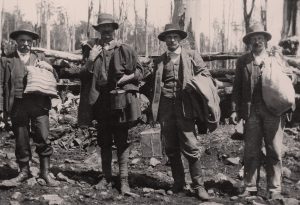
No knapsacks? Alf Smith (left) and fellow miners preparing to climb the Black Bluff Range, 22 October 1909. All of them seem ill equipped for the long haul up and over the mountain. Ron Smith photo courtesy of the late Charles Smith.
The foot track of a century ago climbed a spur of Mount Jacob through eucalypt forest, affording views of the Shepherd and Murphy Tin, Tungsten and Bismuth Mine and the All Nations Tin and Tungsten Mine near Moina. Like the present-day Devonport Gold Mine vehicular track, the foot track avoided the gorge formed by a creek running eastward from Tiger Plain towards the Iris River. Today the vehicular track has spread out like a delta on both sides of the creek, suggesting that over the years people have chosen different crossing points. One day I met a bearded old man coming down the hill to the stream crossing. His flowing hair and team of dogs made me wonder if he was the ghost of Philosopher Smith returning from a prospecting expedition.
Philosopher’s son took the staked track which crossed the range to the Lea River. As it began to descend from its exposed highest point Smith diverted from it to the east, endeavouring to find the track to the Devonport Prospecting Association (DPA) Gold Mine, as it was then known. This is the opposite of today, when you take the right-hand fork, confirming that the vehicular track did not follow the line of the earlier walking track up the hill. The walking track went further to the west, closer to the edge of Golden Cliff Gorge, the great north-south rift through the Black Bluff Range caused by a fault line.
At last Smith found the fallen stakes denoting the DPA track. He reached Alf Smith’s hut at 4.25 pm, after a journey of more than nine hours from Forth. The hut, Smith wrote, was built of red (pencil) pine, there being a small stand of it nearby. It had
‘a fireplace at the east end, and a verandah on the north side, under which the door opened. Two bunks (single), one above the other, took up the west end and a double bunk half the north side … A window, one large sash, was in the south side’.[4]
The hut was well furnished, with table, stools and even cooking and eating utensils. Next day Smith visited the trig station on Black Bluff, travelling mostly by compass through the mist, and photographed the DPA adit and the blacksmith’s shop near it.[5]
It was a poor gold mine. Early assays approached a very respectable ounce per ton, but this was due to the sampling of surface enrichment that could not be expected to continue at depth. Examining both the irregular quartz vein cut in the adit and the gossan accessed in trenches, in 1913 Government Geologist William Harper (WH) Twelvetrees predicted only ‘negligible quantities of gold’ at depth, with the ore changing to iron sulphide.[6] Subsequent geological reports and returns confirmed this, but the allure of gold kept men coming.[7]
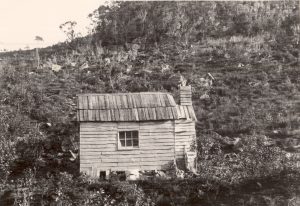
Alf Smith’s hut at the Devonport Prospecting Association (DPA) Mine, 1907.
Ron Smith photo courtesy of the late Charles Smith.
Depreciation of the British pound in 1931 gave the gold price a boost. In a repeat of the 1890s depression, diggers retried old gold shows, hoping to plunder a supposed reef that had failed to yield its treasure last time. Hunting also drove men into the bush, with 1934 being a record season for ringtails. Cliff Beswick and Reg Ling were reworking Black’s Lea River Gold Mine when Bernard ‘Barney’ Fry walked off a nearby cliff while out possuming by acetylene light.[8] Cashman’s Gold Mining Syndicate sank new shafts and extended one of the adits in search of the Lea River lode in 1940.[9]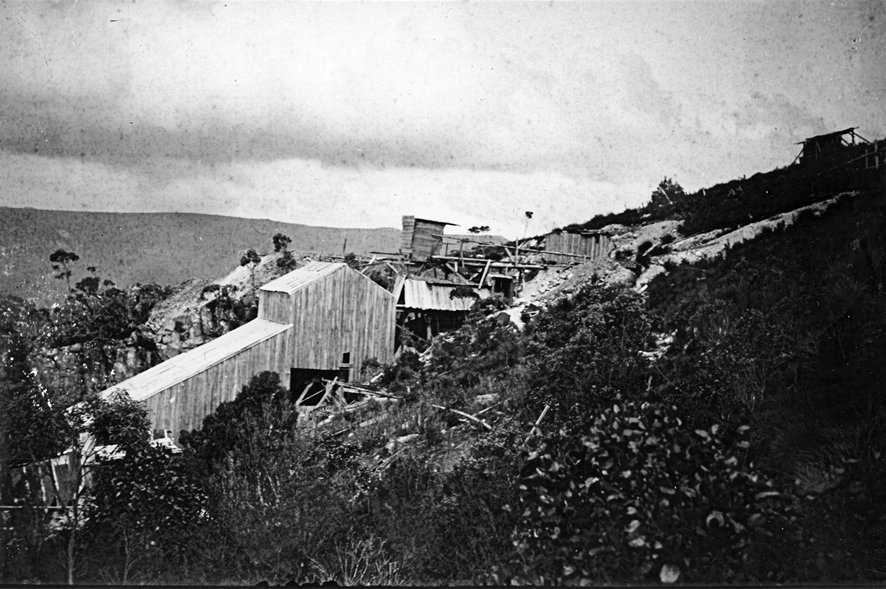
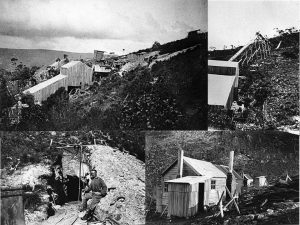
(Clockwise from top left) Probably 1950s photos of the gravity-fed mill; the trolley way from the adit to the mill; the entrance to the adit; and the huts, Devonport Gold Mine. Colin Dennison Collection, University of Tasmania Archives.
The final abandonment of the mine left infrastructure to crumble high on the exposed spine of Black Bluff. Historian Dr Peter Bell’s examination of the overgrown, plundered site in 1995 revealed a technological morass, including a 1923 Crossley oil engine that was set up to power a treatment plant on the opposite side of Devonport Creek, a Forwood Down grinding pan, a 1920s–30s Lister oil engine, a steam winding engine and a late-nineteenth-century Cameron steam pump. The purpose of some of the gear was by then unfathomable.[12]
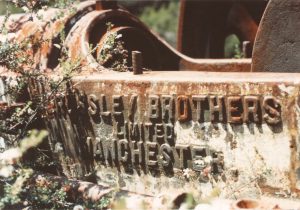
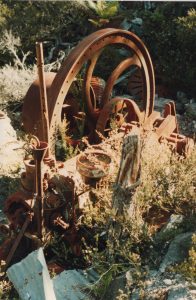
Crossley engine and flywheel, 1995. Nic Haygarth photos.
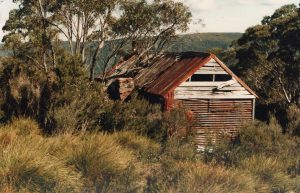
Devonport Mine hut from the rear, looking towards Stormont and the Lea River valley. Nic Haygarth photo.
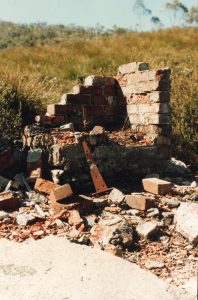
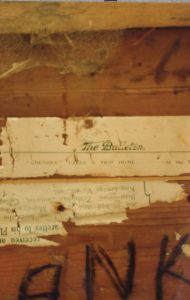
The remains of what was probably the blacksmith’s shop; and the adventures of Chunder Loo, Devonport Gold Mine, 1995. Nic Haygarth photos.
The two-room hut still stood, although the broken windows were covered up and the exterior boards appear to have been torn off and used for firewood, exposing the wall cavities to the elements. There was no recovery from here without urgent attention. Inside the hut you could read the wallpaper—pages of Sydney magazine the Bulletin from 1915! (One of the pages featured ‘Chunder takes a trip home’, satirical verses by Ernest O’Ferrall, whose Sri Lankan character Chunder Loo originally appeared in newspaper advertisements for Cobra boot polish. O’Ferrall’s Adventures of Chunder Loo, illustrated by Lionel Lindsay, was later issued as a book, with verses appearing in the Bulletin.)[13] This aged wallpaper suggested that part of the hut, at least, dated from the first operation of the mine, possibly even incorporating elements of Alf Smith’s pencil pine hut.
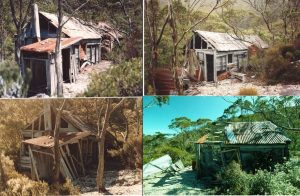
Going, going … almost gone. Devonport Mine hut time lapse 1995-c2015. Nic Haygarth photos.
The vehicular track enabled the Crossley to be removed from the mine, reducing the site’s integrity but allowing restoration of the now rare engine at Pearn’s Steam World, Westbury. Since the exterior walls were removed, the two-room hut has declined rapidly, such that within a few years there will be no standing walls at the Devonport Mine. Rarely was gold fever more virulent than here, defying geological argument for most of a century.
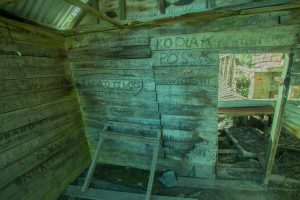
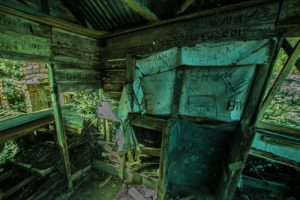
Nic Haygarth photos c2015.
[1] Ron Smith diary, 13 December 1907, NS234/16/1/4 (TAHO).
[2] Nic Haygarth, Baron Bischoff: Philosopher Smith and the birth of Tasmanian mining, the author, Perth, Tas, 2004, p.136.
[3] ‘A Barren Bluff find’, North Western Advocate and the Emu Bay Times, 19 February 1902, p.3.
[4] Ron Smith diary, 13 December 1907.
[5] Ron Smith diary, 14 December 1907.
[6] ‘Middlesex district’, North West Post, 5 March 1914, p.4.
[7] See, for example, QJ Henderson, ‘Departmental report on the Devonport Mine, Black Bluff’, Unpublished reports, 1939, pp.61–64.
[8] ‘In darkness: stumbled over cliff: hunter’s death’, Examiner, 5 June 1934, p.7.
[9] ‘Gold at Black Bluff’, Examiner, 13 March 1940, p.4.
[10] ‘Gold at Black Bluff’, Advocate, 9 March 1942, p.4.
[11] Peter Bell, Devonport Mine near Black Bluff: report to Tasmania Development and Resources, Archaeological Survey Report 1995/03, Historical Research Pty Ltd, Adelaide, 1995, p.2.
[12] Peter Bell, Devonport Mine near Black Bluff, pp.1–4, 17–18, 24–26.
[13] Douglas Stewart Fine Books website, https://douglasstewart.com.au/product/adventures-chunder-loo/, accessed 14 December 2018.
by Nic Haygarth | 08/12/18 | Story of the thylacine, Tasmanian high country history
Arthur ‘Cutter’ Murray reckoned that thylacines (Tasmanian tigers) followed him when he walked from Magnet to Waratah in the state’s far north-west—out of curiosity, rather than malicious intent. If he swung around suddenly he could catch a glimpse of one.[1] However, Cutter did better than that. In 1925 he caught a tiger alive and took it for a train ride to Hobart.
Tigers are just one element of the twentieth-century tale of Cutter and his elder brother Basil Murray. Yet for all their exploits these great high country bushmen started in poverty and rarely glimpsed anything better. Cutter married and produced a family, but his weakness all his working life was gambling: what he made on the possums (and tiger) he lost on the horses. Basil made enough money to keep the taxman guessing but was content to live out his days in a caravan behind Waratah’s Bischoff Hotel.[2]
Their ancestry was Irish Roman Catholic. Basil Francis Murray (1893–1971) was born to Emu Bay Railway ganger Edward James (Ted) Murray and Martha Anne Sutton. He was the couple’s ninth child. Arthur Royden Murray (1898–1987?) was the twelfth.[3] Three more kids followed. The family lived at the fettlers’ cottages at the Fourteen Mile south of Ridgley while Ted Murray was a ganger, but in 1907 he became a bush farmer at Guildford, renting land from the Van Diemen’s Land Company (VDL Co).[4] Guildford, the junction of the main Emu Bay Railway line to Zeehan and the branch line to Waratah, had a station, licensed bar and state school, but was also a centre for railway workers, VDL Co timber cutters and hunters. Edward Brown, the so-called ‘Squire of Guildford’, dominated local activity.
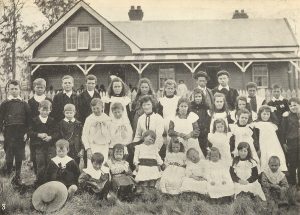
Guildford Junction State School, with teacher May Wells at centre. From the Weekly Courier, 10 November 1906, p.24.
Squaring sleepers, splitting timber, hunting, fencing, scrubbing out bush, driving bullocks, herding stock, milking cows and setting snares were essential skills for a young man in this locality. Like others, the Murrays snared adjoining VDL Co land, paying the company a royalty. Several Murray boys escaped Guildford by serving in World War One, but Cutter recalled that his father would not let him enlist.[5] Basil also stayed home.[6] Perhaps it was enough for Ted and Martha Murray that they lost one son, Albert Murray, killed in action in France in 1916.[7]
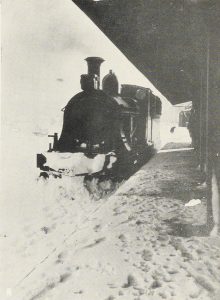
Guildford Railway Station during the ‘great snow’, 1921. Winter photo, Weekly Courier, 18 August 1921, p.17.
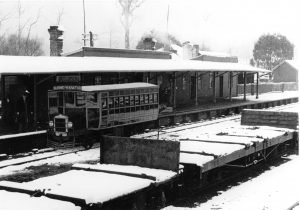
Guildford Station under snow again, 24 September 1930. RE Smith photo, courtesy of the late Charles Smith.
Twenty-three-year-old Arthur Murray appears to have married Alice Randall in Waratah during the ‘great snow’ of August 1921. He would already have been a proficient bushman. Cutter learned to use the treadle snare with a springer, although he would also employ a pole snare for brush possum and would shoot ringtails. He shot at night using acetylene light to illuminate the nocturnal ringtails, but he found it easier to go after them by day by poking their nests in the tea-tree scrub. ‘It was like shooting fish in a barrel’, Cutter’s son Barry Murray recalled. ‘It was only shooting as high as the ceiling … A little spar and you just shook it … and they’d come out, generally two, a male and a female …’[8] Hunters aimed for the nose so as to keep the valuable fur untainted.
In the bush Cutter lived so roughly that no one would work with him. Some tried, but none of them lasted. His huts and skin sheds on the Surrey Hills were little more than a few slabs of bark. Friday was bath day, which meant a walk in Williams Creek (east of the old Waratah Cemetery), regardless of weather conditions. Cutter’s son Val once snared Knole Plain with him, but couldn’t keep up. Snares had to be inspected every day, the game removed, and the snares reset. Cutter and Val took snaring runs on opposite sides of the plain, but Val found that even if he ran the whole way and didn’t reset any snares, Cutter would be sitting waiting for him, having long completed his side.
Cutter’s most substantial skin shed was near home base, on the hill above the primary school at Waratah. Here he would smoke the skins before an open fire. He pegged them out both on the wall and on planks about eighteen inches wide, each plank long enough to accommodate three wallaby skins. When the sun shone, he took the laden planks outside; otherwise he sat inside the skin shed with his skins, chain smoking cigarettes in empathy. A skin shed had no chimney, the idea being that the smoke would brown the skins as it escaped through the cracks between the planks of the walls. The air was so black with smoke that Cutter was virtually invisible from the doorway.[9] Yet no carcinogens prevented him reaching his eighties.
Joe Fagan claimed that Basil Murray was such a good snarer that he once snared Bass Strait.[10] Basil preferred the simple necker snare to the treadle, and caught a tiger in such a device on Murrays Plain, a little plain above the 40 Mile mark on the railway named after Ted Murray.[11] Cutter caught a couple of three-quarters-grown tigers. One was taken dead in a treadle snare with a springer on Goderich Plain when Cutter was hunting with Joe Fagan.[12] Joe kept the skin for years as a rug, but when it grew moth-eaten he tossed it on the fire—oblivious to its rarity or future value.[13] Cutter caught the other thylacine alive in a treadle near Parrawe.[14] He trussed her up and humped her home, where ‘a terrific number of people’ came for a look.[15] ‘They’re very shy animals really, and quite timid’, he recalled of the captive female. ‘It behaved just like a dog and it got very friendly. But when a stranger came near it would squark at them.’[16] At first he couldn’t get her to eat. The breakthrough came when he skinned a freshly caught wallaby, rolled the carcase up in the skin with the fur on the inside, and fed it to the tiger while it was still warm.[17] In June 1925 ‘Murray bros, Waratah’ advertised a ‘Tasmanian Tiger (female)’ in the ‘For sale’ columns of the Examiner and Mercury newspapers.[18] Hobart’s Beaumaris Zoo offered £30 for it, prompting Cutter to deliver her by train. It was his only visit to Hobart. Four cruisers of the American fleet were in town, and Cutter recalled that ‘it was so crowded you could hardly move. I didn’t like it much’.[19]
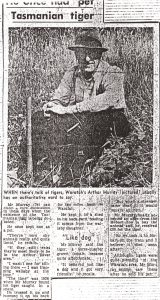
Cutter tells his story, Mercury, 13 February 1973, p.12.
The other big event in Hobart at the time was the Adamsfield osmiridium rush, which ensnared Basil Murray. In the last quarter of 1925 he pocketed £126 from osmiridium, the equivalent of a year’s wage for a farmhand.[20] Later he spent six months mining a tin show alone at the Interview River. Having set the exact date he wanted to be picked up by boat at the Pieman River heads, Basil hauled out a ton of tin ore on his back, bit by bit.[21] On another occasion he worked a little gold show on the Heazlewood River, curling the bark of gum saplings to make a flume in order to bring water to the site.[22]
It was pulpwood cutting that gave Arthur Murray his nickname. When Associated Pulp and Paper Mills (APPM) started manufacturing paper at Burnie in 1938, it turned to Jack and Bern Fidler of Burnie company Forest Supplies Pty Ltd for pulpwood.[23] Over the next two decades Joe Fagan supplied about one-third of the pulpwood quota as a sub-contractor to the Fidlers. At a time when Mount Bischoff was a marginal provider for a few families, and osmiridium mining had fizzled out, Fagan became a significant employer, with about 65 men splitting barking and carting cordwood to the railway at Guildford for transport to Burnie.[24]
A good splitter would split about 3 cords of wood (a cord equals 128 cubic feet of timber) per day. Cutter held the record for the best daily effort, 8½ cords. Unlike most splitters, he never used an axe, but wedged off and split the billet into three pieces. Yet Cutter’s pulpwood stacking exasperated Joe Fagan. Unlike other men, Cutter did not stack his pulpwood as he went. Pulpwood cutters were paid according to the size of their stacks, and the large gaps in Cutter’s hasty, last-minute efforts ensured that he got paid for a bit more fresh air than he was entitled to. Kicking one such stack, Joe growled:
‘I don’t mind the rabbits goin’ through, Arthur, but I bloody well hate those bloody greyhounds behind them goin’ through the holes’.[25]
World War Two was a lucrative time for snarers. £15,000-worth of skins were auctioned at the Guildford Railway Station in 1943, while more than 32,000 skins were offered there in the following year. Record prices were paid at what was probably the last annual Guildford sale in 1946.[26] Taking advantage of high demand, the VDL Co dispensed with the royalty payment system and made the letting of runs its sole hunting revenue. One party of three hunters was reported to have presented about three tons of prime skins as its seasonal haul.[27]
Both Murrays cashed in. Cutter made £600 one season.[28] Working with Eric Saddington at the Racecourse, Surrey Hills, Basil took 3000 wallabies in 1943. Unfortunately their wallaby snares also landed 42 out-of-season brush possums (21 grey and 21 black)—which landed the pair in court on unlawful possession charges. Both men were fined.[29] Basil had a reputation for being a ‘poacher’, and one story of his cunning, apocryphal or not, rivals those told about fellow poacher Bert Nichols.[30]
According to Ted Crisp, Basil was sitting at the bar at the Guildford Junction Railway Station when two Fauna Board rangers came in on the train and announced they were looking for Basil Murray, whom they believed had a stash of out-of-season skins. Then they set off for his hut, rejoining the train to go further down the line:
‘Old Baz headed down by foot and took after them, he was a pretty good mover in the bush and the trains weren’t real fast … and by the time he got down there, they’d found his skins, decided there were too many to carry out so they’d hide them and pick them up at a later date, and of course old Baz was sitting there watching them, they had to catch the train back a couple of hours later, they left and old Baz picked up the skins and moved them to another place …’
By the time the Fauna Board rangers got back to Guildford, Basil was still in the bar, propped up against the counter.[31] However, the taxman did better than the Fauna Board rangers. Basil seems to have been a chronic tax avoider. He and Eric Saddington were camped at Bulgobac, squaring sleepers and snaring, when they were busted for not filing tax returns for the years 1941–42–43.[32]
Basil kept on in the same vein, landing a £25 fine for not lodging a 1943–44 return and then a whopping £60 for the 1947–48–49 period.[33] Things finally got too hot for Basil, who adjourned to the Victorian goldfields for a time.[34]
In 1951 Basil was the cook for the party re-establishing the track between Corinna and Zeehan. One of the track-makers, Basil’s nephew Barry Murray remembered him as ‘a good old cook, as clean as Cutter was rough. They were just opposites. He had a big Huon pine table. He used to scrub it with sandsoap every day, and he would have worn it away if he’d stopped there for two or three years’.[35] Basil became well known as APPM’s gatekeeper at the Hampshire Hills.
In 1963 Cutter Murray was one of Joe Fagan’s men recruited by Harry Fraser of Aberfoyle in a party which investigated the old Cleveland tin and tungsten mine and recut the Yellowband Plain track to Mount Lindsay. At the party’s Mount Lindsay camp Cutter used snares to reduce the numbers of marauding devils that were tearing through the canvas tents, biting the tops off sauce bottles and biting open tins of beef and jam.[36]
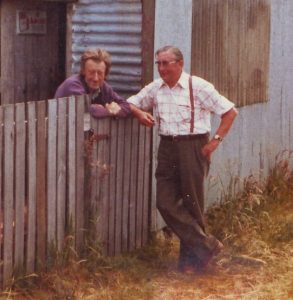
Cutter Murray (left) and friend at Waratah. Note the Ascot cigarettes advertisement on the wall behind him. Photo courtesy of Young Joe Fagan.
Cutter snared until virtually the day he died in the 1980s, making him—along with Basil Steers—one of the last of the snarers. He possumed on North’s block and took wallabies on the Don Hill, under Mount Bischoff, wheeling the skins home draped over a bicycle. A great snaring dog, a labrador that he had trained to corner but not kill escaped game, made his life easier.[37] Nothing is known to remain of his hunting regime, not a hut or a skin shed. Barely a photo remains of the hardy bushman. His tiger tale flitted across the country via newspaper in 1984, then was forgotten.
Unfortunately Cutter Murray’s travelling tiger has an equally obscure legacy, apparently dying soon after it was received at the Beaumaris Zoo.[38]
[1] Barry Murray, interviewed by Nic Haygarth, 21 November 2008.
[2] Barry Murray, interviewed by Nic Haygarth, 23 July 2011.
[3] Registration no.484, born 16 May 1898, RGD33/1/85 (TAHO). Basil Murray’s years of birth and dirt are recorded on his headstone in the Wivenhoe General Cemetery, Burnie.
[4] ‘Ridgley’, North West Post, 8 October 1907, p.2.
[5] Cutter Murray; quoted by Mary McNamara, ‘Have Tasmanian tiger, will travel … but only once’, Australian, 1984, publication details unknown.
[6] Basil and John Murray were refused an exemption (‘Waratah Exemption Court’, North Western Advocate and the Emu Bay Times, 11 November 1916, p.2; ‘Burnie: in freedom’s cause’, North Western Advocate and the Emu Bay Times, 13 January 1916, p.2), but there is no record of Basil serving.
[7] ‘Tasmanian casualties’, North Western Advocate and the Emu Bay Times, 22 September 1916, p.3.
[8] Barry Murray, interviewed by Nic Haygarth, 23 July 2011.
[9] Barry Murray, interviewed by Nic Haygarth, 23 July 2011.
[10] Joe Fagan to Bob Brown and Ern Malley, 1972 (QVMAG).
[11] Barry Murray, interviewed by Nic Haygarth, 23 July 2011.
[12] Cutter Murray and Joe Fagan to Bob Brown and Ern Malley, 1972 (QVMAG).
[13] Harry Reginald Paine, Taking you back down the track … is about Waratah in the early days, the author, Somerset, 1994, pp.62–66.
[14] Cutter Murray and Joe Fagan to Bob Brown and Ern Malley, 1972 (QVMAG).
[15] Cutter Murray; quoted by Mary McNamara, ‘Have Tasmanian tiger, will travel … but only once’, Australian, 1984, publication details unknown.
[16] Cutter Murray; quoted in ‘He once had pet Tasmanian tiger’, Mercury, 13 February 1973.
[17] AAC (Bert) Mason, No two the same: an autobiographical social and mining history 1914–1992 on the life and times of a mining engineer, Australasian Institute of Mining and Metallurgy, Hawthorn, Vic, 1994, p.571.
[18] See, for example, ‘For sale’, Examiner, 17 Jun 1925, p.8.
[19] Cutter Murray; quoted by Mary McNamara, ‘Have Tasmanian tiger, will travel … but only once’.
[20] Register of osmiridium buyers’ return of purchases, MIN150/1/1 (TAHO).
[21] Barry Murray, interviewed by Nic Haygarth, 21 November 2008.
[22] Barry Murray, interviewed by Nic Haygarth, 23 July 2011.
[23] Steve Scott, quoted by Tess Lawrence, A whitebait and a bloody scone: an anecdotal history of APPM, Jezebel Press, Melbourne, 1986, p.25.
[24] Kerry Pink, ‘His heart belongs to Waratah … Joe Fagan’, Advocate, 10 August 1985, p.6.
[25] Barry Murray, interviewed by Nic Haygarth, 21 November 2008.
[26] ‘£15,000 skin sale at Guildford’, Examiner, 14 October 1943, p.4; ‘Over 32,000 skins offered at sale’, Advocate, 13 September 1944, p.5; ‘Record prices at Guildford skin sale’, Advocate, 30 July 1946, p.6.
[27] ‘£15,000 skin sale at Guildford’, Examiner, 14 October 1943, p.4.
[28] Barry Murray, interviewed by Nic Haygarth, 23 July 2011.
[29] ‘Trappers fined’, Advocate, 22 October 1943, p.4.
[30] For Nichols’ poaching, see Simon Cubit and Nic Haygarth, Mountain men: stories from the Tasmanian high country, Forty South Publishing, Hobart, 2015, pp.116–19.
[31] Ted Crisp; quoted by Tess Lawrence, A whitebait and a bloody scone: an anecdotal history of APPM, p.26.
[32] ‘Men fined’, Mercury, 5 May 1944, p.6.
[33] ‘Fines imposed for income tax offences’, Mercury, 5 September 1946, p.10; ‘Fined for tax breaches’, Examiner, 6 July 1950, p.3.
[34] Barry Murray, interviewed by Nic Haygarth, 23 July 2011.
[35] Barry Murray, interviewed by Nic Haygarth, 23 July 2011.
[36] AAC (Bert) Mason, No two the same, pp.570–71, 577, 579.
[37] Barry Murray, interviewed by Nic Haygarth, 23 July 2011.
[38] Email from Dr Stephen Sleightholme 26 December 2018; Cutter Murray stated his belief that it died soon after arrival in Hobart in ‘He once had pet Tasmanian tiger’. I thank Stephen Sleightholme and Gareth Linnard for their contributions to this story.
by Nic Haygarth | 21/10/18 | George and Sarah Bell Quaker diaries
George Bell (1805–52) was born in Scotland and migrated to New South Wales on the barque Minerva in 1832, the voyage from Leith to Sydney lasting 5 months and 10 days, including a a stopover of more than three weeks in Hobart Town. Arriving finally in Sydney, he took a job working in the store of his brother David Bell. In February 1834 George Bell decided to see what he could of inland New South Wales before he returned to his native Scotland. The trip lasted almost a month and included one of the earliest recorded accounts of visiting the Bungonia Caves.
27/2/34. Having arranged with my brother I left Sydney by the afternoon coach to Liverpool. After passing Ireland’s the soil seemed poor & but little of it cleared. What was called Irishtown appeared to be a few miserable looking wooden huts. At Bowlers Bridge I left the coach & found Lennox with his party of convicts of whom he is Superintendent. After having tea with him, he walked with me to Bowler’s inn where were we shewn into a fine newly furnished room & after he left, I went to sleep on one of the sofas. Next morning I walked down to the creek & found L giving instructions to his men who are building Lansdowne Bridge. He provided bfast after which we set off in a boat with a man & boy who rowed us down Prospect Creek to George’s Hall where we landed & walked thro’ the
p.203 garden eating peaches & water melons. Embarking again we reached George’s River on the banks of which we saw cultivated fields at intervals. Landing on the right bank we rested at the house of Rowley a settler. Walking on thro’ the bush we came to a new stone mill of which the dam was broken down & the house deserted. Went thro’ it & on to the freestone quarry where an iron gang were at work preparing stones for the bridge. Many of the convicts had nothing but trousers on, their bare backs being exposed to the hot sun & 3 soldiers watching them. They get their bread & beef under an awning & at night are locked up in strong wood houses, where each one has a blanket & lyes [sic] on the boards, 20 in each house. Here I met a corporal who enlisted in Glasgow & he accompanied me to the river where I bathed. It is here as broad as the Clyde & very deep with numbers of blubber fish in it. After having some beef & damper we set off in the boat on our return, but it was dark for an hour before we reached the bridge L & I taking a pull at the oar to relieve
p.204 the men. Had tea with L who saw me safe in Bowler’s where I went to rest.
1/3/34 After having bfast with my friend I left by coach for Liverpool & was pleased at the neat clean appearance of the town. Here I took my seat in an open breaking carriage & passed thro’ a district but little cleared for some miles after which the houses were more numerous & the most of the land adjoining the road cleared. A hot wind blew & our 2 horses came to a stand still at the foot of every hill, so that it was near 3PM before we reached Campbelltown which is a long straggling village. After resting in the inn I determined to walk to Glenlee about 4 miles. The district is well cleared & when I reached Gl I found the tutor Kerr at home with whom I walked in the garden & got a ripe almond off the tree which I was not aware grew in the colony. I was also shewn thro’ the dairy &c this being the most noted farm in NS Wales for fresh butter. Took tea with Kerr & his pupils, the young Howe’s [sic], whose mother ordered
p.205 that I should be shewn up to one of the best bedrooms where I went to rest. The house was elegantly furnished.
2d Was Sabbath as I then believed, but nevertheless I was up soon after sunrise & having roused Kerr he put me on my road which I pursued thro’ the bush to a cottage of the farm of Eldeslie, the Proprietor of which J Hawdon was not yet out of bed, so I went on until I emerged into a cleared district & got upon the highway opposite Kirkham, Capt Coghill’s farm. The roadside inn I passed, supposing I would come to another soon. By the Cowpasture bridge which is well built of wood I crossed the Nepean which is here a considerable stream. The road led thro’ the bush on to the ascent over Razorback where I made up a stock keeper of Underwood’s with nearly 100 cattle which I assisted to drive over the mountain which is very steep & much labor has been expended in making a road over it. When over the height I went in search of water, the want of which I felt very much, but I found none till I reached
p.206 the foot of the hill where I saw a stockade & some drays on the road, the men of which I accosted & requested water & bread which they gave me & offered to make tea if I would wait. Here I sat in company with the outcasts of the human race, & heard one of them avow that he would steal his father’s shoes if he thought he could make anything of them! They were civil to me & on parting I gave them a fig of tobacco. In a short time I came in sight of Abbotsford which stands in the midst of a fine farm & I found the proprietor Geo Harper at home who introduced me to his wife whom I found very agreeable. After dinner we walked in the garden which is large & well stocked with flowers & fruit trees. In the evening we talked of a deep precipitous ravine called Burragorang which I had a great desire to see but it was 15 miles off & difficult to find without a guide & my kind host was too busy to go with me.
8. I took my departure after bfast & was going in a wrong direction when
p.207 I met a man who set me right on a cleared road thro’ the bush. Crossed Myrtle Creek which is a small stream with a deep rocky bed, & arrived at Lupton’s inn about mid day when I had a second bfast & rested sometime. Starting again I walked 8 miles thro’ forest land to Keighran’s at Little Forest but did not like the appearance of the house, so that I passed on by the old line of road & soon recollected that I was now in Bargo brush, a noted place for bushrangers, which made me walk a little smarter that I might get thro’ it in time. The wood is very close, but after a few miles I entered an extensive flat where the trees were thinly set & I found several drays here laden with wool, the men belonging to which had taken up their quarters for the night. Coming to some cultivated ground with house & a windmill I made my way to Cutter’s inn which I found a clean comfortable house & here I enjoyed my tea, feeling very tired.
p.208 On the 4th I arose soon after sunrise & took my road thro’ the bush in a fine sharp morning, being the coldest I have felt in this country. In about 1½ miles I came upon the new line of road which I pursued for about 3 miles thro’ forest until I found a cart track leading to the right which I followed thro’ the bush & saw some beautiful blue & red Parrots. Passing thro’ a beautiful piece of low open forest land I came to Wm Coghill’s whose dogs frightened me when going to the house which was a common wooden one. Here I found the master laid up & unable to move from rheumatism & the whole house in confusion from their having been obliged to raise the flooring to destroy a snake which had got in beneath. After having bfast & a chat with poor WC I took my leave. Returning to the main road I went on to Berrima where I met with Tasker who was kind & I dined with him in his slab hut. He then made me got on horseback, shewed me the
p.209 site of the intended stone bridge over the river Uinjeecaribee which we forded & proceeded thro’ the bush to the farm of Jn Atkinson whose lady recd us kindly & we had tea with her, her husband being up the country. She told me of a very high waterfall at the Meryla mountain, also of a beautiful plant, the “Burwan” producing nuts which the aborigines eat after soaking them in a running stream for a certain time. Returned to Berrima with Tasker with whom I took up my quarters for the night. The banks of the river are high & there are a few house building on the township.
5th. After having bfast with Tasker I rode on with him until near Oldbury, to which I turned off & walk [sic] nearly a mile to enquire after James Atkinson whom I understood to be very ill, but his wife & Dr Colyer made his illness an excuse for not seeing me, so that I was not even asked to sit down. I turned away with my feelings rather excited, & when I got back to the road
p.210 I found my friend T giving orders to his men who were building a bridge over Medway rivulet. Taking my leave of him I followed the road which led me thro’ bush, with a farm every few miles. I was very thirsty & could find no water for 8 miles until getting to the bottom of a steep & long descent I saw a kangaroo pursued by dogs & found myself close to a roadside inn kept by Beadman. Here I had tea & would have remained for the night but my money was nearly spent, so that I determined to go on to Wingelow altho’ I knew nothing of the Proprietor Campbell. Descending to Paddy’s [sic] river [sic] which seemed a sluggish stream & ascending the opposite bank I soon after came to a road party by whom I was directed to Wingelow. I therefore left the road & followed the fence until I despaired of finding the house so that I thought of sleeping in the bush, but a little farther on I saw the house, crossed the fence, & accosted
p.211 a man who kept the dogs off me so I reached the house & enquired for Campbell. He came out & appeared a genteel looking man not much older than myself. On making him acquainted with my name &c he at once welcomed me, said he knew my brother, shewed me into his parlor [sic] & drew a bottle of wine for me. This was all in such contrast to what passed at Oldbury, that I felt highly pleased. He took me into his garden where we each had a melon, & then we saw his two flocks of sheep folded for the night. On returning to tea he introduced me to his wife, a plain but lady looking woman with two beautiful young daughters. Here I passed a pleasant evening, looking over the Edinr Lity Gazette, chatting of books &c. Heard that I might be able to have a view of the Shoalhaven gullies & spar caves without greatly increasing my tour & this I determined to accomplish if possible. C told me a remarkable occurrence in the life of the old reprobate John Dickson
p.212 of Sydney who imagined at one time that he had seen the devil & he did not swear & blaspheme for 3 mos after.
6th. In the morning I looked at “Littles NS Wales” & to bfast we had hot rolls. The cottage is small but well furnished & on taking leave he walked nearly half a mile with me to shew me the path. After getting on the old line of road a saw a number of very small birds flying in the bush which might almost be taken for butterflies. I easily found Barber’s wooden house which was about ½ mile of the road & is well furnished. I found him at home & stated my wish to see the gullies &c upon which he said he was sorry his sons were from home, who would have gone with me. He gave me a draught of milk & water & invited me to call on my return & so we parted. Walking on a few miles I came up/ with a dray & a flock of sheep, & one of the dogs came quietly behind & catching the skirt of my surtent [?] tore it a little. I walked along with one of the men who informed
p.213 me as to my way, so going on I went up to the next house & accosted a plain looking man who I found was Mitchell whom I was in search of. He took me in & introduced me to his wife whom I found a chatty intelligent woman the daughter of a French emigré [sic]. Feeling tired I thought I had best have a nights [sic] rest before visiting the Gullies, & they offered me a bed but I preferred going on to the township of Inveraray where I went up to the first house & enquired whose it was? “Oh this is the jail sir”! [sic] was the answer I received, but I soon found out Style’s with whom I found Packer, & Roberts the butcher was there also who told us some curious details respecting the Sydney butchers outwitting each other in buying cattle when they were scarce. After leaving tea we sat chatting till about 11PM before we went to bed.
On the morning of the 7th after having bfast Styles supplied me with a mare on which I rode to Mitchell’s when he & his son started on foot
p.214 along with me. We soon reached the limestone country where there are many cavities having holes at the bottom called hoppers. Masses of rich ironstone were also lying at several places. After proceeding 3 or 4 miles we came all at once to the brink of the Shoalhaven gullies which appear as a steep precipitous glen with a stream at the bottom from 12 to 1500 feet below the spectator. The bare perpendicular rocks with the Grass trees on their summits the steep declivities clothed with trees, & the stream at the bottom looking as if a mere rivulet, form altogether a romantic & impressive scene, & shews that the general level of the district must be about 2000 ft above the sea. I could have admired the scene for hours, but our time being limited we took a peep from several points & then retraced our steps to the caves. Descending a large hopper we scrambled down the hole at the bottom & found ourselves
p.215 in a circular cavity of about twenty feet diameter. Scrambling farther down into a dark corner we stood near the brink of a deep pit into which we threw stones. They hissed thro’ the air & I could count 25 before they reached the bottom when the sound was like thunder & sometimes a fragment would fall still further & drop into water. Returning to the surface we went into another Hopper [sic] where about 16 ft deep there was a hole down which I partly went & would have gone altogether had it not been dangerous. I was told it was a very extensive & intricate cavern, full of stalactites, but without lights & a long rope, it was a daring venture to attempt to explore its recesses. Being unprovided we were obliged to desist, so we made our way back to our dinner which we found ready & I was pleased with the conversation of the worthy couple which
p.216 might be said to be both literary & scientific. They told me of a beautiful small quadruped called the sugar squirrel. After sitting sometime I bade them farewell & rode off to Dr Reids [sic] whose wife wished me to remain with them in their bark hut which has been their residence & was shewn a fine stone house nearly finished into which they mean to remove. It was dark when I left, but was shewn the road by a man to Styles where I found Packer still who played on the violin & flute.
8th. After having bfast I took my leave & walked on the road which led thro’ the bush to Grose’s farm & passing a hut now & then I arrived at Palmer’s where I was informed that to go thro’ the bush to McFarlanes [sic] was only 6 miles but to follow the road 15 miles. I preferred the road, & went on & in a few miles came to a fine flat country with the trees standing wide & flocks of white cockatoos flying about & screeching. I kept the road until near Lake Bathurst, & on to the border
p.217 of a fine green plain clear of trees where I was delighted with the view which was terminated by a distant range of mountains. Here I struck off the road to the right & followed a cart track for 3 or 4 miles until I came to a waterhole & now I found I had lost my road.
Taking notice of the course I was pursuing by the sun I looked about & cooeed repeatedly, but got no answer. Going on I came to the track of wheels & then to a sort of road which I followed at a quick pace until was gladdened with the sight of a flock of lambs. The shepherd led me on a short distance & then told me to make haste & follow the road down a hollow which would lead me to McFarlanes [sic]. I walked on rapidly until near sunset when I came to a dray the man of which told me I was still 4 miles from McF’s, but his master Faithful’s
p.218 was only one mile so I resolved to make for the nearest which I reached just as it was dark. Here I was surprised to find my friends Styles & Packer & they were so also to see me. They were in the company of Faithful a fine looking young man standing 6 ft 3 in & I was glad to find a cup of coffee ready for me as I had nothing to eat since bfast.
9th. Next morning after partaking of bfast with my friends I again bade them farewell & took the road, being cautioned to beware of Ryan’s dogs, so I kept a good lookout & altho’ I saw two large dogs rambling about I gave them a wide berth & reached Inveralacky at last where I found my friend Wm McGarvie along with Jas McFarlane in his new stone house which is still unfinished & the roof low Feeling tired & my feet pained I did not go out much & went to bed early.
10/3/34. Three of the Aborigines came to the
p.219 farm. After dinner McF, McG, & I got mounted & rode thro’ the bush by Coven creek where there was abundance of fine grass & we had a draught of water from a spring. Towards even we got on the plains of Lake George where we saw a pair of wild Turkeys. McF could not find the house he intended to take us to, which caused us to ride over the hills where we had a splendid view of the sun setting across the lake. When nearly dark we reached a stockyard of Lithgow’s of which the overseer asked us into his turf hut where he supplied us with tea in tin dishes & the labor of cutting the damper made me perspire. He provided us with sleeping places for the night, to which we retired after chatting &c.
11th. Next morning I went down to the lake & waded in a good distance the water deepening very slowly with a sandy bottom & I bathed with the water just have my knees. It was slightly brackish with a number of wild ducks swimming in it, & it was evident the water had receded
p.220 to a great extent from its former height. Returning to bfast I found a supply of excellent pancakes fried in fat, having satisfied our appetites with which & at her viands we got our nags ready & rode off. Taking our course thro’ a level stony district in which were flocks of sheep we crossed a high range of hills where the dogs killed a kangaroo rat, but we saw no Kangaroos. We had another range to cross after which we went along grassy flats to Inveralacky passing a tree which had been shivered with lightning. After dinner I had a long walk with Jas McFarlane to whom I mentioned my intention of returning to Scotland.
12th. In the forenoon I rode out with McF into the bush & collected a herd of cattle which he left me to drive a short distance by myself. In doing so I tumbled off the mare & fell on my back without injury & the quiet animal stood until I remounted. We drove the cattle into the stockyard, & in the afnoon the strange cattle were drafted out of the herd.
p.221 On the 13th I felt my back very much fatigued. Mc with 4 or 5 men were hard at work culling & branding the calves &c, & I employed myself in keeping the brands hot. Had a short ride in the af noon.
14th. Was spent strolling about the farm & into the bush a short distance where we saw a large native dog which the dogs of the farm were killing.
15th. In the forenoon I took a long ramble into the bush by myself & noticed that had I not paid attention in regard to my course by the sun I would have pursued a different route in returning to the farm which I arrived at all right. After dinner I again rambled away & met a sawyer Spears with whom I returned. He told me he would be free by the end of this month & he had long been a smuggler in Scotland about Girvan & Straianraer [?]. Saw a bullock killed by being pithed [?]. McF asked me to go with him after tea & keep a look out on the potatoe [sic] field as he suspected they were robbed. We went to the farthest paddock just as the new moon was setting & there we detected
p.222 two of the men among the potatoes. McF ordered the off to their huts, but we did not find any potatoes dug up.
16/3/34. After bfast McG mounted along with McF & I walked to Lake Bathurst where the country looked parched & the lake greatly dried up, leaving a broad level shore on all sides. We stopped at a rocky place where were some trees & which had evidently been an island when the lake was 10 or 12 feet higher. Here McG stopped & I mounted his mare, but in trotting along my foot got out of the stirrup & I soon rolled off, but the ground being soft I was not hurt providentially. McF contrived to stop the animal & I remounted, but could not manage to sit firm in the saddle. Numbers of ducks, &c a pair of Black Swans were swimming on the water which is mot more than about 4 miles long. We rode thro’ a dry swamp & on to Cooper & Levy’s Station where the overseer gave us milk & water to drink. Returning to where we left McG he took the mare & I walked back to dinner. In the evening our host
p.223 produced a Bible in which I read aloud, which lead to conversation in which he remarked that he feared he had more sins to answer for now, than he might have had, had he remained in Scotland.
19th. In the af noon we took the dogs into the scrub, but only started a kangaroo rat which escaped into a hollow tree. In the evening Dun McF arrived from Monaroo [sic] where he had been for 6 or 8 mos with the sheep. He told us of the mineral spring, & also of a large Plain with a Lake in its centre lately discovered to the SW.
20th. Having bfasted & made ready we took leave of Duncan McFarlane & Inveralacky, riding off with his brother James who went along with us to Goulburn Plains where we saw the Bustard. After riding a few miles along with McGarvie & I over the grassy plain, he took farewell of us & kept on to the township of Goulburn while we went more to the right. The plains are about ten miles across & nearly destitute of trees or bushes.
p.224 Passed some flocks of sheep & shepherds’ huts & rode on till we entered the bush & came upon the road to Bong Bong. This led us to a creek near to which were the old huts of a road party, & we allowed our mares to eat & drink for a short time, at same time feeling the want of food ourselves having brot nothing with us to eat. Mounting again we walked our animals taking a short trot now & then, & made our way thro’ rather a thickly wooded district without meeting a human being until we emerged on the banks of the Wollondilly which seemed a large deep stream with steep banks. Made another halt to let the mares feed & then riding on we were glad after a ride of 30 miles to see a farmhouse after which a few miles brought us to the roadside inn kept by Peters. After seeing our mares fed we were glad to sit down & enjoy our tea being both tired & hungry.
19th. In the night we heard it raining but in the morning we had bfast after which we mounted & set out
p.225 in a fine day. The road led thro’ the bush & was very hilly we came near Paddy’s River when we supposed we had taken the wrong road & turned back till we met Donald who was following us to take back his masters [sic] horses. He put us right & we crossed the river where it was very shallow. Then thro’ bush land & over high hills until we came upon the broad made road where we stopped for our mares to partake of the grass while we ate some damper. A little further we procured some milk & water from a hut & passed several farms, the land being cultivated in part. I was in a laughing humour [sic] & highly amused at our being obliged to keep our lazy beasts going by thumping their hides with sticks. My comrade was also in better spirits than yesterday & would have us stop at the Talbot inn & have some porter to drink. Shortly after we passed the “Ploughed Ground” where there are several settlers & a weather boarded place of worship. We were now in the district of Sutton Forest & had but a few miles farther when we in descending a hill came in sight
p.226 of the flat on which are the few houses of Bong Bong. Crossed the river on a wooden bridge & to the inn kept by Lareby who sent our mares with their foals to Bowman’s Paddock according to our instructions, as we were now done with them. Fining it was only about 4PM we ordered tea in an hour & meantime we washed ourselves & rested. After tea we walked out & saw the coach arrive from Sydney which brought us the newspaper. In paying our bill we found they charged us 2/3 each for bed.
20th Started in an open carriage drawn by 2 horses along with J Berry. We had a very bad & steep road over Mittagong, on the op of which there is an extensive view. The air was cold in the morning & the road all thro’ bush to Cutters [sic] inn. Here we got another passenger, Shepherd lately from Monaroo. The wind was strong & in passing through Bargo Brush, two trees fell about 100 yards behind us. We bfasted at Luptons inn, where we were well served
p.227 There we changed horses, the new pair having to take us 32 miles! At Stonequarry we turned off the Menangle road which led us over a high hill thro’ the summit of which the road is cut, & then thro’ a good deal of cultivated land, passing Buckland’s & D’Arrietta’s farms to the Menangle ford across the Cowpasture river. Here a party were at work forming a road down the sandy banks of the river, of which the water was low. At Campbellton [sic] we stopped at Hurley’s & dined & it was nearly 2° [sic] before we started, when Richards the proprietor went with us, for whose accommodation I sat between J Berry & the driver. Soon after passing Denham Court [sic] a gale with rain came up behind us but we soon reached Liverpool where went to Wood’s Ship Inn. After having tea I went & called on Capt Thompson & was introduced to his wife & daughters, the eldest of whom is rather a good looking girl. Returned to Woods to sleep.
21st. Was a cold morning & when we
p.228 started in the coach, we found in it a Scotchman Stevenson from Cathcart near Glasgow He gave me a strange account of Lady Wyld to whom he was overseer. Altho’ we had 2 sets of 4 horses each to Sydney we travelled at a slow pace to the Royal Hotel where our journey terminated.
















